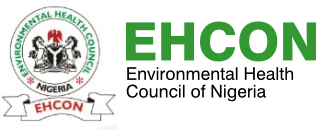Environmental Health is a major branch of public health, which plays a significant role in disease prevention, control and the sustenance of environmental integrity. It has been defined as ‘the control of all factors in man’s physical environment which exercise, or may exercise, a deleterious effect on his physical development, health or survival’. Environmental Health therefore is a broad concept in public health, which is ‘the science and art of preventing disease, prolonging life and promoting health through organized efforts of the society.
The outcome of environmental health organization is the prevention, detection and control of environmental hazards which affect human health through the following functions as specified by World Health Organization:-
1. waste management;
2. food control and hygiene;
3. pest and vector control;
4. environmental health control of housing and sanitation;
5. epidemiological investigation and control;
6. air quality management;
7. occupational health and safety;
8. water resources management and sanitation;
9. noise control;
10. protection of recreational environment;
11. radiation control and health;
12. control of frontiers, air and sea ports and border crossing;
13. pollution control and abatement;
14. educational activities (health promotion and education);
15. promotion and enforcement of environmental health quality standards;
16. collaborative efforts to study the effects of environmental hazards (research);
17. environmental health impact assessment.(EHIA).
Following the establishment of Council, efforts has been made to raise the level of environmental health practice in the Country. This is because environmental health has continued to play a major role in disease prevention, control and the sustenance of environmental integrity worldwide. The reality agreed by experts that over 70% of diseases causing the highest morbidity and mortality in the country are environment related, makes the control of environmental health practice crucial in the efforts of government to alleviate poverty and achievement of the Millennium Development Goals.
The realisation that many practitioners of environmental health do not even know that their practice constitute environmental health practice has compounded the task of regulating their practice. It is in an effort to ensure that the most basic of all the practices in the area of environmental health are regulated that and minimum standard of practice established that has necessitated the issuance on the 8th of May 2007 by Chief (Mrs) Helen Esuene, the then Hon. Minister of Environment, Housing and Urban Development the National Environmental Health Practice Regulation 2007.
These regulations are expected to control most basic environmental health practice, ensuring that minimum practice guidelines for such services like Public Health Pest Control, Cleaning Services, waste collection and transportation and Inspection of Premises are practised within the minimum standards approved by the Council. It is hoped that strict adherence to these Regulations will equally give the needed support to genuine practitioners to further invest in the delivery of environmental health services to create employment and enhance growth within the sector.
To further explain the regulations, the Council has developed National Guidelines on Environmental Health Practice in Nigeria 2006. The purpose of this document is to provide guidelines to Registered Environmental Health Officers, licensed operators of Environmental Health services to ensure a high standard of hygiene and sanitation in their service delivery.
It is hoped that by the time genuine operators are encouraged and quacks and other charlatans excluded from the practice of environmental health, the level of service delivery will increase and improve.
EHOs are well placed to participate meaningfully in new approaches to environment and health management. The profession has sub-professional groups that must work under the supervision of the EHOs. These cadres include:
1. i.) Environmental Health Technicians
2. ii.) Environmental Health Assistants.
The challenges posed to mankind by inadequate management of environmental factors, emerging and re-emerging of infectious diseases in our communities, have necessitated the need to regulate the profession and strengthen the professionals.
To perform environmental health functions effectively, the EHO requires: (i) investigative skill; (ii) analytical skill; (iii) communicative skill; (iv) educative skill; (v) organizational skill and (vi) attitudinal skill.

